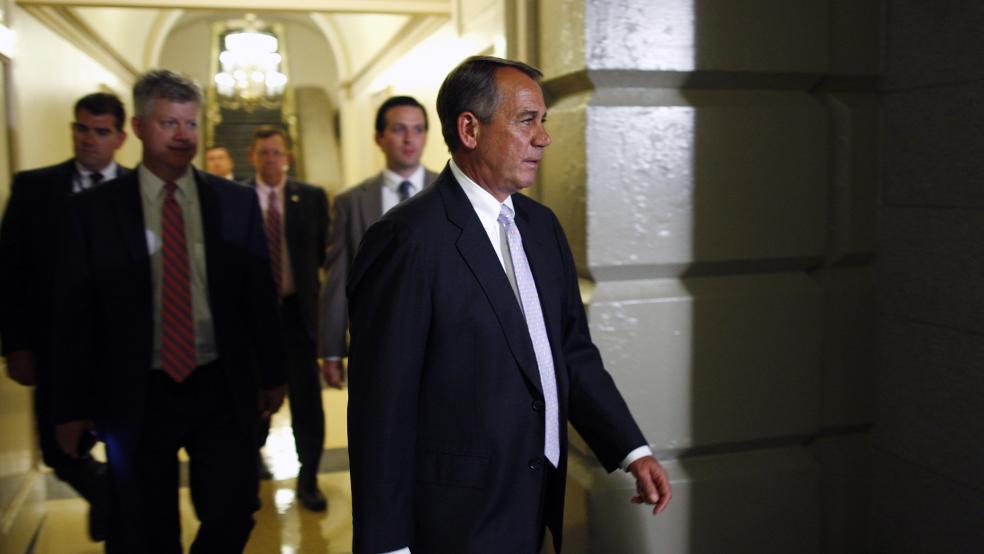The probability of a federal government shutdown next week greatly increased early Sunday morning as a defiant Republican-controlled House passed another short-term spending bill that requires a one-year delay in implementing the Affordable Care Act.
early Sunday morning as a defiant Republican-controlled House passed another short-term spending bill that requires a one-year delay in implementing the Affordable Care Act.
The vote was 231 to 192, with two Democrats voting yes, and one Republican voting no. The bill now goes to the Senate for approval--a non-starter, by all accounts, vitually assuring a government shutdown.
Discounting pleas from President Obama and Senate Majority Leader Harry Reid (D-NV) to send the Senate a “clean” continuing resolution free of anti-Obamacare measures, the House vote keeps the government open through Dec. 15 provided the administration agrees to put the president’s signature health care law in moth balls for a year and repeals a two-percent tax on medical devices essential to financing Obamacare.
The House also approved a measure to guarantee that U.S. troops would continue to be paid, even if the rest of the government shuts down. The Department of Veterans Affairs told Congress on Friday that all benefit checks it issues, including disability claims and pension payments, will be disrupted if a government shutdown lasts more than two or three weeks.
RELATED: THE MOST LUDICROUS PART OF A GOVERNMENT SHUTDOWN
“The American people don’t want a government shutdown, and they don’t want Obamacare,” House Speaker John Boehner (R-OH) and his lieutenants said in a statement, after Republicans met in the basement of the Capitol to discuss strategy. “We will do our job and send this bill over, and then it’s up to the Senate to pass it and stop a government shutdown.”
The House last week approved a continuing resolution including one-year defunding of Obamacare, but the Senate rejected it on Friday and sent back a resolution funding the government through Nov. 15 with no other conditions. Reid warned Saturday that this latest House short-term spending resolution was “pointless” would be dead on arrival in the Senate – which may reconvene on Sunday to respond to the House action.
“After weeks of futile political games from Republicans, we are still at square one: Republicans must decide whether to pass the Senate’s clean CR, or force a Republican government shutdown,” Reid said.
The only glimmer of hope for a compromise at this point is if Senate Democrats and the White House reconsider their outright rejection of repealing the medical devices tax – a measure approved as part of the Affordable Care Act that has drawn sharp fire from lawmakers on both sides of the aisle.
House Republicans may have had that possibility in mind in in the way they carefully crafted their new continuing resolution. Instead of assembling a single package subject to an up or down vote, the Republicans broke the continuing resolution into separate pieces, so that senators could vote yes or no to the one year postponement of Obamacare, the repeal of the medical devices tax and the measure to protect military spending.
Senators now will have the opportunity to reject the delay of Obamacare but support the elimination of the medical devices tax and then return the continuing resolution to the House for a final vote on Monday.
RELATED: THE ECONOMIC IMPACT OF A GOVERNMENT SHUTDOWN
During a meeting of House Republicans around noon on Saturday, several members suggested that the medical device tax repeal provision might constitute a compromise that would win substantial Senate support. However, Reid has dismissed it as a “dumb” idea and the White House says Obama would not go along with it.
The medical devices tax is projected to raise $30 billion over the coming decade to help fund Obamacare. Opponents argue that the levy would slow innovation in the medical device field and cost jobs. The Advanced Medical Technology Association has waged a high-priced lobbying effort against the tax, and the group enjoys strong backing from a bipartisan coalition in the House and Senate.
Earlier this year, the Senate voted 79 to 20 on a non-binding resolution to repeal the measure. So presumably, there would be considerable sympathy in the Senate for the new House amendment knocking out the tax.
But the repeal faces big hurdles– chiefly the question of how to make up the lost revenue and avoid crippling Obamacare. That revenue will be essential to providing tax subsidies to lower income people seeking insurance coverage in new exchanges being formally launched on Tuesday.
“Our problem is, you repeal the medical device tax and replace it with what?” Rep. Jim McGovern (D-Mass.), a member of the House Rules committee, said in an interview Saturday. “If Republicans can’t get a delay in the implementation of the bill, they’ll try to defund it,” he added. “Look, I’m open to repealing the medical device tax if you can find a better alternative. . . But if you don’t want deficit spending, you have to pay for these things.”
Rep. Charlie Dent, a moderate Republican from Pennsylvania, was one of those touting the repeal of the medical device tax as a possible route to a compromise. “Seventy-nine senators have indicated that they favor repeal of the medical device tax,” he said. “I think they [the Senate] could accept that. And they would likely reject the [Obamacare] delay.”
The medical device industry is one of the most profitable in America, racking up an estimated $40 billion annually in earnings on $130 billion in sales. Hundreds of companies make everything from tiny syringes, stents and implanted heart valves to giant CT scanning machines. The best known firms are headquartered in Midwestern states like Minnesota, Indiana, Ohio and Pennsylvania.
Under mounting pressure from Senate and House Tea Party conservatives to stand fast Boehner and other senior Republicans vowed to press for major administration concessions on Obamacare – even if it results in the first government shutdown in 17 years.
“We have for a long time said . . . that Obamacare is not ready and that delay is clearly essential,” said Rep, Darrell Issa of California, chairman of the House Oversight & Government Reform Committee. “And if you think about it, the president for eight months in a row has every month had at least one delay he’s put into effect. If unions and large corporations and special interests are each getting waivers from the mandate, shouldn’t the American people get a waiver from the individual mandate, and that’s really what we’re going to do in this bill.”





